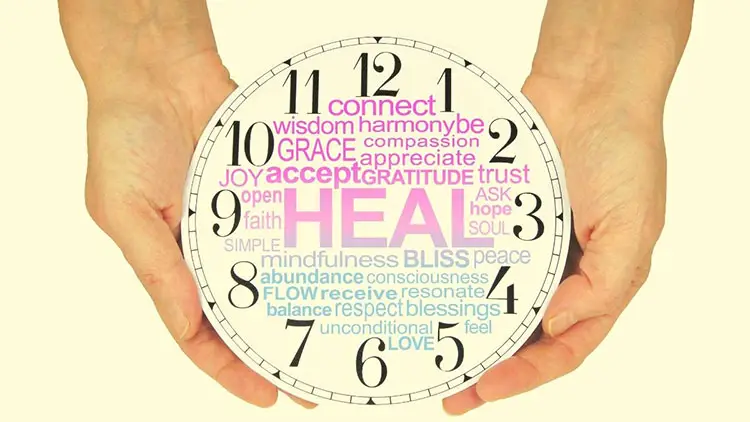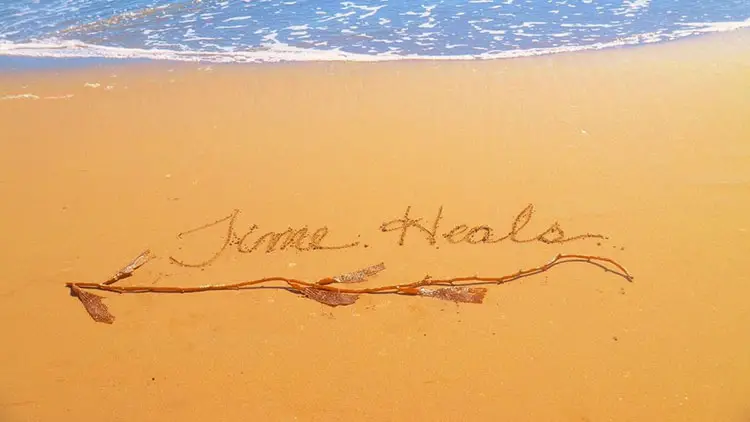When people grieve, an unfortunate response is invariably, “You will heal in time.” But does time heal all things?
While time does play a role in diminishing grief and pain, grief is a complex emotion, and it takes more than the shifting sands of time to shake off negative feelings.
The Role Time Plays In Healing
The role of time in grief management depends on how it is used. Time can be an opportunity to rethink and rework the future.
This happens when people attempt to gain insight into a failed relationship and use time to bring about positive changes in their own behavior. This can result in better future relationships and go a long way in healing past mistakes.
During this healing time, a person can connect with new friends, try new things, and think about what they want in the future. This usually results in understanding how to approach the next relationship with increased confidence.
As an example, a person who has just left a relationship can wallow in pain and bemoan the fact that “all men/women are the same; who needs this? Never again.”
That is time not used wisely. Another person will consider their own behavior and contributions within the failed relationship. What could they have done better?
That is time used to learn and heal. The difference is a choice in how people respond to adversity and pain. Some face it as a learning experience, while others use it to confirm that adversity and unhappiness are natural and to be expected.
How Long Does Does Grief Last?
There is no way to escape grief and pain in life. The loss of a loved one, the dissolution of a relationship or job, will always lurk as a possibility. It can happen to anyone.
If one simply feels sorry for oneself, grief can last a lifetime. However, finding a support group, reading self-help books, and journaling are all active ways of dealing and overcoming grief.
Self-pity isn’t really dealing with the situation. This is being passive as the pain is never acknowledged. In these circumstances, the grief and sense of loss will continue to linger without any time limits. Being an active participant in your own healing is crucial.
Family can also play a supportive role. There are ways families can comfort a widower, for example. Those in grief need to know they’re not alone.
To quote psychotherapist Nathaniel Branden, “Fear and pain should be treated as signals not to close our eyes but to open them wider.”
Communicate Your Needs
Friends and family will likely want to help you heal during times of grief. They have their own ways of coping, from ensuring that you eat properly to involving you in some outside activities. Everyone has different needs when it comes to grieving, and it is important to communicate those needs to the loved ones who are attempting to help.
Let them know if their actions are being helpful or unhelpful. Someone may wish to drag you to a social function, but it is not the right time for you. Or if a neighbor brings over a nightly casserole, and you want nothing more than to put a stop to that, it is up to you to make that clear while thanking the friend for his or her concern. There is no need to feel guilty for expressing your needs.
Your own active participation is crucial in the healing process. A part of that is acknowledging your needs and expressing them candidly.
As time progresses, your needs will likely change. The nature of grief requires people to move through a number of phases. Your needs will adjust as you adjust through each phase, and you need to communicate that, as well.
Feeling Ambivalent About Loss
Can anyone feel ambivalence toward a major loss? Absolutely. This happens more often than we think, and it is one of the most difficult losses to heal. Ambivalent describes the feelings we have toward somewhat we have lost. It can be a parent who was abusive or a spouse who made the widow’s life miserable. They are gone, and the world expects us to feel grief.
There is an abundance of books we turn to when dealing with grief. But what happens when the relationship was difficult or conflicted? Chances are, there will be much unfinished business between you and the deceased. Many feelings are cluttering your thinking.
Below are some of the situations that may bring on ambivalent feelings following the loss of another person:
- Frequently, we may have had a strained relationship with a parent or sibling for years. When that person dies, there are likely many unresolved issues. Perhaps we had hoped for some reconciliation or improvement, but that will never happen now. That is painful in addition to the pain of the loss. That is when many of us report being “ruled from the grave.”
- We find ourselves stuck in a relationship that can move neither forward nor backward. We may replay the issues over and over in our mind without resolution. A part of us grieves for a supposed loved one while another part is breathing a sigh of relief that he or she is gone. That is a difficult truth to accept.
- The first step is to practice forgiveness. Forgiveness is not the same as accepting the wrongs someone did you. Forgiveness means healing yourself and your emotions, not the other person. Forgive yourself for your ambivalent feelings. A trained therapist can be very helpful in these instances.
Talking about the loss is critical because in these situations, much of the conflict was never verbalized. Instead, there may have been years of internalized resentment. It may take more time to heal when you are dealing with unresolved conflict, but as always, you have the choice to be proactive in your own healing.
Behaviors that Add Time to the Healing Process
Getting Stuck in Anger
Anger is one of the stages of healing that we need to go through. When we experience a loss, we naturally become angry. Perhaps you feel deserted by the deceased and are angry at him or her. The anger may be directed at the cause of death. The anger isn’t always specific. It can be vague and overwhelming. All you feel is that an injustice was committed, and you see no way to right the wrong.
Feeling anger is a phase of grief that you must go through to end up on the healing side. But if the anger festers, it can cause emotional harm and delay the healing.
The longer you hold on to anger, the longer you will grieve. It will certainly set back your recovery. Internalized anger is very much like a caged animal. It needs to be released. Those feeling need a way out.
Anger lingers when you keep obsessing about your loss. Some people replay the loss in their heads in a constant loop. This can go on for years. They may keep re-reading the loved one’s letters. They keep replaying an argument in their heads over and over.
While anyone can feel more vulnerable following a loss, when someone is overwhelmed by the loss, he or she may respond by becoming hyperalert and constantly remaining ready for the worse to happen. With some people, the anger can last for years, with no healing in sight.
Again, talking to a trained therapist may help put these feelings in perspective.
Time Can Heal – With Your Help
When it comes to healing, moving forward is critical, regardless of how difficult it is. The first step is to acknowledge that it is difficult and that it will take time. But in some ways, grief is like a tunnel. There invariably is a light at the end of it.
Practice Self-Care
While treating yourself to a new outfit, a massage, or a weekend away may seem cruel and impossible following a loss, self-care is one of the first steps in healing. It can be as simple as treating yourself to a nice meal, reading a good book, taking a fragrant bubble bath, or seeing a movie. During the healing process, exercise and healthy eating should become a natural lifestyle.
Some people may shrink at the thought of spoiling themselves after losing a loved one. However, self-care should not be frivolously dismissed. It can shorten the healing period to allow you to move on with your life.
Therapy
Anyone grieving from a loss can likely benefit from therapy.
Some people can go through the stages of grief and come out in one piece, ready to resume their normal life. There will always be a loss, but the pain diminishes. These are the lucky ones.
For others, when the grief simply lingers, therapy may be the answer. People have different types of mindsets. Some people are more positive about life than others. Others are already prone to depression, or a negative mindset, and will have a much harder time.
The difference between pain and depression is easy to recognize. Pain relates to the loss of someone of value. Depression is a more general feeling with a lack of joy at its core. When a depressed person is grieving, the load he or she carries becomes even heavier. Grief can trigger dormant depressed feelings.
It is important to respect your grief. Acknowledge it. Write a letter to the deceased and express your feelings. Share good memories with him or her. Perhaps have a space that serves as a special memorial.
Don’t Get Stuck in Mourning
Sometimes, people cling to grief as if it were a lifesaver. To them, letting go of the grief means letting go of the loved one. As long as they can grieve, the loved one remains at their side.
These people can simply deny the impact of the loss instead of working through the grieving process. Not to mourn seems like betrayal of the loved one.
Such a grieving person can’t permit any happiness and relief to enter his or her life. Any feeling of joy is a denial of the loss. Some people can continue to cling for years and consider it proof of their love and devotion.
So Does Time Heal All Things?
Everyone handles pain differently. In most cases, the bad feelings abate with time. However, to quote from the lyrics of a song, it can be a “long and winding road.” Life may never to the same as it was prior to the loss, but it does go on. We may even find a new love.
When a loved one has died, the feelings of loss are natural, and if we are active in the grieving process, it will get easier with time. In these instances, the things that needed to be said, such as “I love you,” were said and understood.
There are no rules about the length of time that healing takes. We all face loss and grief sooner or later. But it is almost certain that we heal faster when we become active contributors to our own healing.





